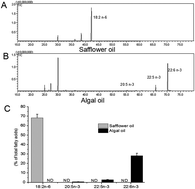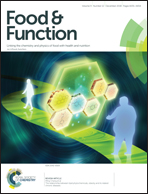Algal oil rich in n-3 polyunsaturated fatty acids suppresses B16F10 melanoma lung metastasis by autophagy induction
Abstract
Melanoma is a malignant tumor that arises from epidermal melanocytes with high morbidity and mortality, and currently, there are no effective conventional genotoxic treatments or systematic treatment. Increasing evidence shows that n-3 polyunsaturated fatty acids (PUFAs) exhibit anti-melanoma activity, but their anti-melanoma mechanism remains elusive. Here, C57BL/6 mice were injected with B16F10 melanoma cells via a tail vein to establish a lung metastasis model. n-3 PUFAs were significantly increased in lung metastatic tissues from mice treated with algal oil, especially rich in docosahexaenoic acid (DHA). Algal oil treatment significantly suppressed pulmonary metastases and outgrowth of melanoma cells, which was associated with autophagy induction, as evidenced by an increase in LC3-II levels. In addition, algae oil-triggered autophagy was mediated by inactivation of the mammalian target of rapamycin (mTOR) and p38 mitogen-activated protein (MAP) kinase, and activation of c-Jun N-terminal kinases (JNKs), which led to a decrease in p62 accumulation and decreased secretion of proinflammatory cytokine interleukin-1β (IL-1β). These results suggest that algal oil exerts its antitumourigenic activities via autophagy-mediated p62 elimination and anti-inflammatory properties.



 Please wait while we load your content...
Please wait while we load your content...